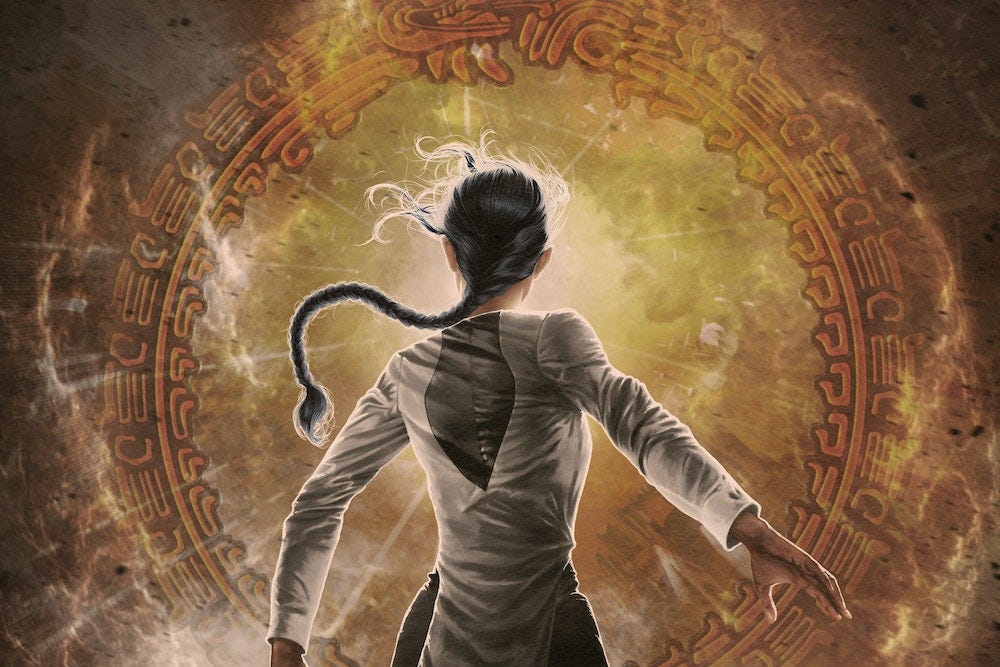Can a trading card game provide a training ground for a better economic system? A microcosm of a more just social structure?
My youngest son has breached his singularity. He has awoken to an unjust and broken world and asked the question of relevancy. Is there anything to be done? Do I matter? Does politics matter? Or are we all simply screwed?
I remember asking these questions when I was a bit older than him. I remember the metaphysical struggle. I came across a quote recently that I find helpful: “When everything is broken, start by fixing anything.”
As I was recently pondering all of the grand societal disfunction we’ve found ourselves swimming in while simultaneously working on the trading card game (tcg) project my youngest and I have been working on since the pandemic, the parallels struck me quite vividly. You see, a tcg is both a game and a specialized economy built around the game’s community. As an example, let’s consider the Pokémon tcg.
The corporate entity of Pokémon sits atop the economic pyramid like both the federal reserve and the three branches of U.S. Government. Pokémon decides when to release a new set of cards, the MSRP of that set, and how much of the set to initially print. Pokémon follows some limited guidelines as it releases that set into the wild (stuff like order limits, and pro accounts, etc.).
But immediately upon release into the wild, the more universal laws of consumer capitalism take over. Pokémon investors (scalpers) typically gobble up a majority percentage of each new printing via VPNs and phony accounts. Compare these vultures to the global banking industry. Their speculation and greed dictates many critical elements of the Pokémon economy such as availability, accessibility, and demand. When a new release is sold out in a matter of hours, the common joe enthusiast is left victim to the whims of the third party market.
But the Pokémon economy is not all doom and gloom. A considerable minority of this third party market consists of good natured local card shops (lcs). These lcs typically buy at a set price and sell at a set price while largely ignoring the sudden price shifts and instabilities in the broader speculative market. But the lcs are not immune to sudden market shifts either. When they cannot obtain product at the standard market price, they cannot sell product at the standard markup either.
Enthusiasts in remote parts of the community are left high and dry with only artificially inflated products available unless they risk purchasing from potential pirates and counterfeiters.
Is there a better way? How could a new tcg release a product more equitably? Can raw, unchecked consumer capitalism be brought under control? Neutered even? Consider the following scenario:
Egalitarian TCG is initially released in digital format exclusively and available only through ETCG’s official website (translated into multiple languages worldwide). Digital card packs cannot be resold. Pricing is universal and affordable. (Cards in different languages can be released in formats priced appropriately for their regional economies.) These digital packs reach any and every enthusiast with a web-enabled device. There is no limit to the initial “print run,” thus there is no anxiety over loading the website just to find the label “unavailable” stamped over the product. The demand sets the value.
There are still common cards, rare cards, and ultra rare cards digitally. The availability and therefore value of these ultra rare cards is of course influenced by how many digital packs are opened. But the accessibility of the cards is entirely egalitarian. There is no “insider advantage.” No speculation. No manipulation. No predation.
Ah, but I hear the objections, “I want to rip physical packs! I gotta hold the cards in my hands, man!” This is true for the vast majority. Thus, ETCG can’t stop with digital. The digital packs would neccessarily be opened within ETCG’s digital application (app). The main function of this app would be twofold: 1) facilitate the trading of digital cards for ETCG credits exchangeable for more unopened digital packs (exchanging these digital assets for fiat currency would create all sorts of difficulties), 2) enable a printing process via local print hubs to be found at your friendly lcs
Printing a digital asset would look something like this: 1) take your device into the nearest local card shop with a print hub. 2) use the screen of the print hub to scan your device. 3) the print hub verifies ownership of the card and that the card has not been previously printed. 4) using preloaded blank cards, the print hub produces a high quality, professional print of your card. 5) the print hub charges you a standard print fee once you approve the quality of the print. 6) Viola! You now hold your physical card in your sweaty hand. (You should probably sleeve it first.)
Under this system, opening packs is accessible and affordable. Only the desired cards are printed, reducing the number of undesired duplicates roaming around in physical form. And nothing is shipped around the world, possibly criss-crossing the globe multiple times before it is even opened. (Blank card templates would have to be shipped to print hub locations.)
Of course, the major limitation within this model is the availability of print hubs, ensuring small communities of enthusiasts in proximity of each hub. While this is an initial drawback, I also see it as a strength. In the long run the localized nature of these enthusiast communities will only make the economy stronger due to the stronger relationships within the community.
Back to the original question, “Can a trading card game model a better way for an entire national economy?” Can undesirable middle men be removed? Can speculation and predation be held in check? Can access to goods be made more universal? Can the distribution of goods take on more of a communal nature and less of a corporate one? All of this while still allowing for innovation and profit?
If You Wish to Start Reading The Green Ones…
[Click here to start at the beginning.]
Thanks so much for taking the time to read these scenes of Boundaries, Season 2 of The Green Ones. I’ll be publishing FREE daily scenes from The Green Ones until…I die…or something terrible happens. Seriously, I’ve got over 100 scenes written so far, and I’ll be writing more until the story reaches its natural ending. You are totally welcome to read the entire story for FREE! If at any point you decide you would rather finish the story in ebook or print format, just click the buttons below and you can do that as well. If you enjoy reading the serial releases, BUT you would also like to support me as a writer (my kids need wine!) please subscribe to my premium content for bonus scenes, exclusives, and insider access to my process. And of course, I’d be grateful if you would share this post with any of your reader friends who you think would enjoy The Green Ones. Happy reading!





